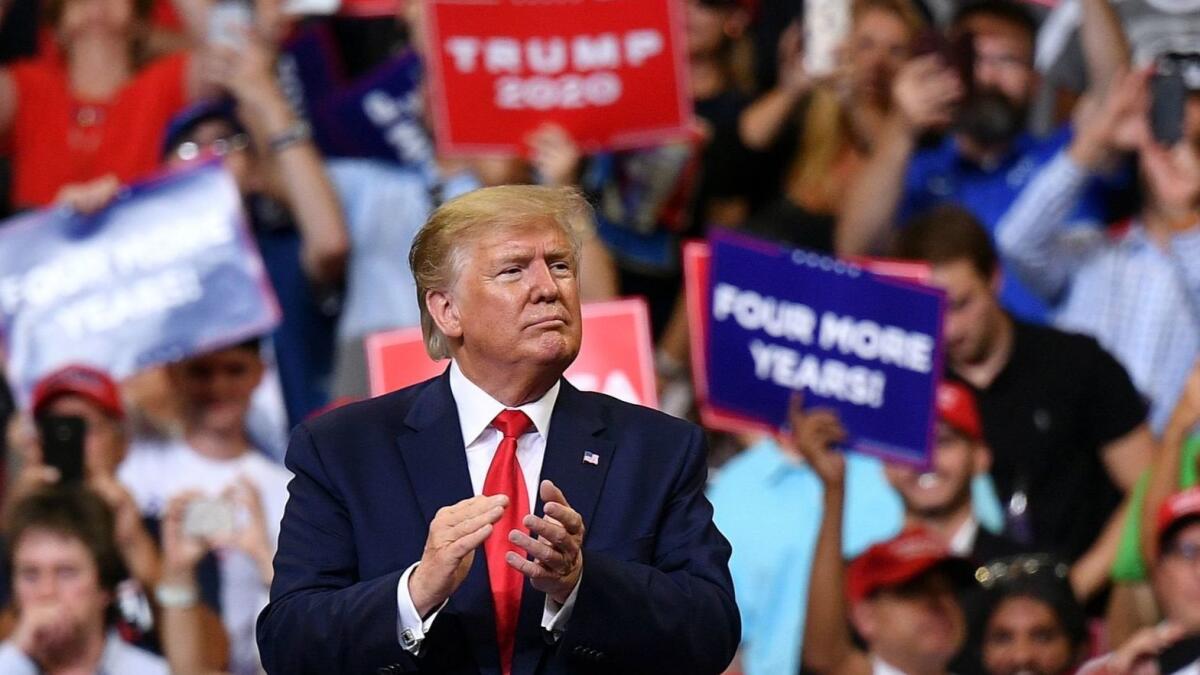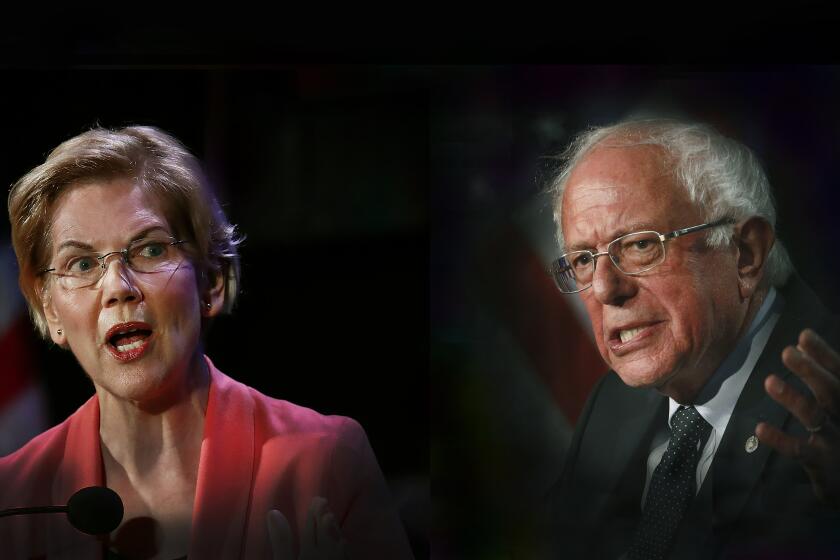Trump’s tax returns required under new California election law

- Share via
SACRAMENTO — President Trump will be ineligible for California’s primary ballot next year unless he discloses his tax returns under a state law that took effect immediately Tuesday, an unprecedented mandate that is almost certain to spark a high-profile court fight and might encourage other states to adopt their own unconventional rules for presidential candidates.
The law, signed by Gov. Gavin Newsom on the final day he could take action after it passed on a strict party-line vote in the Legislature earlier this month, requires all presidential candidates to submit five years of income tax filings. They must do so by late November to secure a spot on California’s presidential primary ballot in March. State elections officials will post the financial documents online, although certain private information must first be redacted.
Democratic progressives Bernie Sanders and Elizabeth Warren slapped back against moderate rivals who ridiculed “Medicare for All” during a fierce Democratic presidential debate Tuesday night.Here are our 6 big takeaways from Night 1 of the debates in Detroit>>
“As one of the largest economies in the world and home to one in nine Americans eligible to vote, California has a special responsibility to require this information of presidential and gubernatorial candidates,” Newsom said in a statement that accompanied his signature on the bill. “These are extraordinary times and states have a legal and moral duty to do everything in their power to ensure leaders seeking the highest offices meet minimal standards, and to restore public confidence. The disclosure required by this bill will shed light on conflicts of interest, self-dealing, or influence from domestic and foreign business interest.”
Trump, who is not singled out by the law but is clearly its inspiration, is likely to fight back.
“The Constitution is clear on the qualifications for someone to serve as president and states cannot add additional requirements on their own,” said Tim Murtaugh, communications director for the president’s reelection campaign. “The bill also violates the 1st Amendment right of association, since California can’t tell political parties which candidates their members can or cannot vote for in a primary election.”
Ronna McDaniel, chairwoman of the Republican National Committee, called the new law “gimmicky” and “just plain dumb.” And during legislative debates on the bill, GOP legislators repeatedly accused Democrats of being motivated solely by their anger at Trump.
“To continue to consistently be hostile, from this legislative body, to the president of the United States is just not something we should do,” state Senate Minority Leader Shannon Grove (R-Bakersfield) said during a floor debate earlier this month. “Quit poking the bear.”
“We’re not poking the bear,” said the author of Senate Bill 27, state Sen. Mike McGuire (D-Healdsburg). “We’re doing what’s right.”
Although it would keep a candidate off the March primary ballot, the new law does not appear to block a candidate who refuses to disclose the information from appearing on the November 2020 statewide ballot. The law also requires candidates for governor to release their tax returns before the statewide primary, beginning in 2024.
Access by the public and news media to a candidate’s personal tax returns has been a touchstone of presidential politics for more than four decades. Following a high-profile fight in 1973 over a tax deduction taken by President Nixon, the practice of releasing the information became largely routine. In the years that followed, just two nominees of the major political parties — President Ford in 1976 and Trump in 2016 — have refused to release their taxes.
Candidates for California governor have been less consistent. While Newsom released five years’ worth of returns in 2017 and his Republican rival John Cox provided summary documents, neither then-Gov. Jerry Brown nor his GOP challengers would divulge details on their finances during the 2010 and 2014 campaigns.
No candidate or officeholder has faced more widespread criticism for keeping a tight grip on their Internal Revenue Service forms than Trump. From his entry into the presidential race in 2015 until now, the president has fended off news of leaked documents and congressional demands for his tax information, insisting that because he was the subject of an audit, he was unable to meet those demands.
Newsom has frequently criticized Trump for his refusal to make the information public.
“Folks think @realDonaldTrump is avoiding tax release because he pays a very low rate,” the governor tweeted in May 2016. “I think its because his finances are a house of cards.”
Earlier this month, when former Gov. Arnold Schwarzenegger tweeted a challenge to the president to release his tax returns, Newsom replied: “Don’t hold your breath.”
Newsom’s signature on SB 27 sets the stage for a nationally watched legal debate over a state’s power to decide which names appear on its presidential ballot.
“I’m sure it’ll be challenged, but I have no confidence in predicting what the courts are going to do,” said Richard L. Hasen, a UC Irvine election law professor.
One likely courtroom argument was provided by California’s last governor. Brown vetoed a similar bill in 2017, arguing it was unlikely to pass constitutional muster and would set a bad precedent.
“Today we require tax returns, but what would be next?” Brown wrote in his veto message. “Five years of health records? A certified birth certificate? High school report cards? And will these requirements vary depending on which political party is in power?”
Hasen said a key question for determining whether the new California law is constitutional is whether courts look back to prior fights over ballot qualifications for congressional candidates or instead view the issue through the broad powers given to state legislatures when it comes to casting votes for president.
Newsom’s signing announcement on Tuesday included statements of support from prominent legal scholars. McGuire said legislators consulted a number of constitutional law attorneys in drafting the language of SB 27. He said it should be viewed the same way as other state requirements such as filing fees or voter signatures needed on nomination papers.
“Releasing your tax returns is really a low bar to hit,” McGuire said Tuesday. “The bottom line is that transparency is the foundation of accountability in government. This is bigger than any one president.”
California lawmakers have not been alone in their effort to force presidential candidates to hand over their tax forms. Legislatures in 18 states have considered the issue in recent years, according to a recent tally by the National Conference of State Legislatures. Most — but not all — have been in states dominated by Democrats. Few observers, though, expect any of the efforts to lead the president to change his position. Last week, Trump sued to stop the House of Representatives from obtaining a copy of his New York state returns, made available under a bill signed by Gov. Andrew Cuomo earlier this month.
Should California’s law remain on the books, it would force Trump to choose: Reverse course on his steadfast refusal to provide tax information or risk that California’s 172 delegates to next year’s Republican National Convention could go to a long-shot GOP challenger. The new California law does not, however, apply the same rules to a write-in candidate — a possible backup plan for Trump, though one that might not do enough to help Republican candidates for legislative and congressional offices who are depending on the party standard-bearer to help drive voters to the polls.
Nor will the law let Democrats off the hook. While the party has a bumper crop of hopefuls seeking to challenge Trump in November 2020, only a few of the top-tier candidates have released their own tax returns. The California statute would force that disclosure early in the campaign cycle, given the state’s decision to move its primary to March. That could mean any unusual tax deductions might play a role in how voters in the first states to select candidates — Iowa, New Hampshire and South Carolina — weigh the merits of the Democratic hopefuls.
Hasen said the debate that will result from California enacting the law is likely to spread to other statehouses around the country.
“If you think of this purely as a political matter and not a legal matter, what could a Republican legislature in a swing state do to hurt a Democratic presidential candidate’s chance to get on the ballot?” he said. “That’s really the Pandora’s box.”
More to Read
Sign up for Essential California
The most important California stories and recommendations in your inbox every morning.
You may occasionally receive promotional content from the Los Angeles Times.












